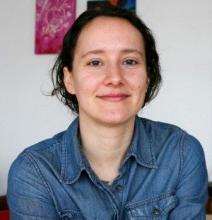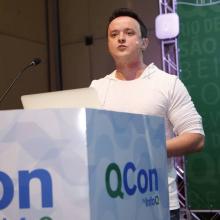Abstract
As a Staff-Plus Engineer, I’ve had plenty of learning moments in my career where I realized my view of a problem was hindered by my own desire to solve it with technology. In this talk, we’ll confront techno-solutionism head-on, walking through my own exploration of ethical machine learning, which eventually led me to specialize in data privacy. Along the journey, you’ll learn tips for recognizing when you’re being more clever than thoughtful, when you need another perspective, when you’re onto something bigger and when you’ve found a problem that will contribute to your own work as well as our world. You’ll also learn about how specialization, diversity, beginner’s mindset and community contribute to identifying real problems where technology can help and create conversations for problems where technology should take a back seat.
Interview:
What's the focus of your work these days?
I've been focused for the past six years on privacy engineering. Essentially, how do we use advanced privacy technologies or privacy enhancing technologies to do safer and more privacy aware data science and machine learning.
What's the motivation for your talk?
My talk is almost like a love breakup letter to ethical machine learning, which I've presented at QCon Sao Paulo several times. I think it's thinking through techno solutions. As a principal engineer or as anybody that has been doing engineering for quite some time, you eventually come across ways that are quite seductive to think about, How can I solve this problem with technology? But often these problems are societal in nature. So in this talk we'll talk about how do you recognize that you're in one of these cycles where you're trying to solve a societal problem with technology? How can you take a step back and recognize where you are and what you can actually do to help, so where technology can support and assist movements for change and when you're probably just actually hurting rather than helping.
How would you describe the persona and level of the target audience for this session?
I'm part of the Staff+ track, so I think we're talking to engineers who have mainly been working in the field most likely 8+ years. I've been doing technology for nearly 15 years now. Obviously, all are welcome. If it sounds interesting to you, you're very welcome, even if you're not Staff+, obviously. But I think what we specifically want this track to focus on engineers who have been doing this for a long time and who have chosen IC tracks or have chosen to be advanced technologies or specialists in their field.
What is it that you'd like the persona to walk away with after watching your presentation?
I'm hoping that you feel happy and inspired, I think that there's a large place for us as technologists who support movements for justice and social change, as well as to think through how we as technologists can help society in real ways. But it also involves confronting some easy pitfalls, almost psychological pitfalls that we need to think about. So I hope that you come away with a few tools and a new inspiration for how we as technologists can be a part of movements for change.
Speaker

Katharine Jarmul
Principal Data Scientist @Thoughtworks
Katharine Jarmul is a Principal Data Scientist at Thoughtworks Germany focusing on privacy, ethics and security for data science workflows. Previously, she has held numerous roles at large companies and startups in the US and Germany, implementing data processing and machine learning systems with a focus on reliability, testability, privacy and security. She is a passionate and internationally recognized data scientist, programmer, and lecturer.





